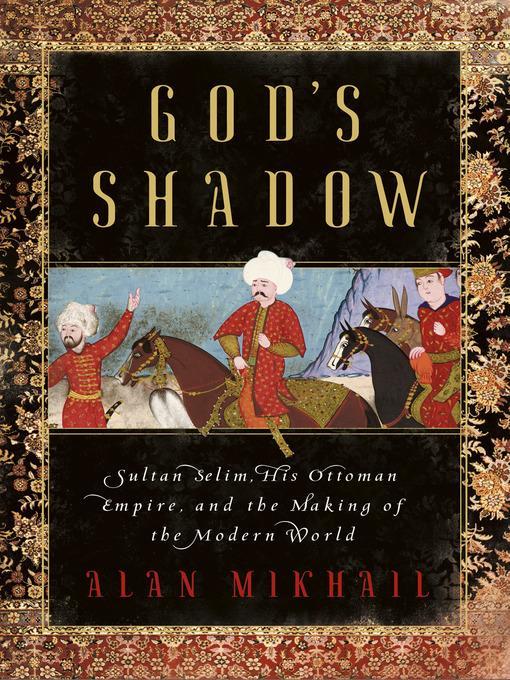
God's Shadow
Sultan Selim, His Ottoman Empire, and the Making of the Modern World
کتاب های مرتبط
- اطلاعات
- نقد و بررسی
- دیدگاه کاربران
نقد و بررسی

Starred review from May 11, 2020
In this revelatory and wide-ranging account, Yale historian Mikhail (Under Osman’s Tree) recreates the life of Sultan Selim I (1470–1520) and makes a convincing case for the outsize impact of the Ottoman Empire and Islamic culture on the history of Europe and the Americas. Tracking Selim’s rise from governor of a recently conquered frontier outpost on the Black Sea to his seizure of the Ottoman throne from his own father, capture of vast territories in the Middle East and North Africa, and investiture as caliph in 1517, Mikhail brings the era to vibrant life. Recasting Christopher Columbus as a Christian crusader bent on countering the Ottoman Empire’s territorial expansion and political and cultural dominance, Mikhail demonstrates how the push for European exploration of the New World actually weakened the Catholic Church, opening the door for Martin Luther and other reformers. Spotlighting the role Selim’s mother, Gülbahar, played in his political education and early administration, Mikhail also sheds new light on female political power during the era, and offers intriguing discussions on topics ranging from the Sunni-Shiite split to the discovery of coffee. Written with flair and deep insight, this thought-provoking account is both a major historical work and a genuine page-turner.

Starred review from May 15, 2020
The chair of the history department at Yale offers an impressive revisionist history of the great Ottoman expansion circa 1500 and its impact on East-West relations. In what he calls "an innovative, even revolutionary" history, Mikhail draws on world-spanning source material to demonstrate the enormous, long-felt influence of the Islamic empire under Ottoman sultans Mehmet II, who captured Constantinople in 1453; and his son Bayezid and grandson Selim who tripled the empire's territory. The author, whose previous books have focused on other elements of the Ottoman realm, convincingly argues that it was the Ottoman monopoly on trade routes, combined with military advances, that thrust Spain and Portugal out of the Mediterranean, forcing the "merchants and sailors...to become global explorers." This included Christopher Columbus, who cut his military teeth as a "Moor-slayer." Mikhail concentrates on Selim as the leader who consolidated his grandfather's successes in a stunningly brief time, eschewing "palace intrigue, factionalism, and greed" in favor of a quest to restore the empire to its former military glory. "Whoever they were," writes the author, "Selim wanted men who would fight with zeal and inspiration, soldiers who were willing to sacrifice." Selim took on the rival Safavid empire and then pushed his brother out of the way to conquer the Mamluk empire in 1517. Selim's conquest of Yemen allowed his army to control the "first truly global commodity"--coffee--and subsequently made it the "phenomenon it is today," a product that "energizes nearly every kind of social interaction across the world." In sharply drawn chapters, many of which contain enough ideas for a separate book, Mikhail restores the Ottoman Empire to its rightful place as a "fulcrum" of global power. The chronology (1071-1566) is helpful, and an ominous coda delineates how the current Turkish president has appropriated Selim's legacy for his own authoritarian purposes. A massively ambitious study, largely accessible and percolating with ideas for further study. (maps, illustrations)
COPYRIGHT(2020) Kirkus Reviews, ALL RIGHTS RESERVED.

Starred review from July 1, 2020
Geographically, Turkey lies at the center of the world. Mikhail (history, Yale Univ.; Under Osman's Tree) argues that Turkey's Ottoman Empire during early modern history was the center of the world's economic, social, and political structure. The work begins in the years following the Ottoman capture of Constantinople in 1453 through the rise of Sultan Selim I. The book details Selim's life from his governorship in Trabzon, Turkey, to his conquests as Ottoman Sultan in the 1510s. Readers gain insight into the incredible influence of the Ottoman civilization at the dawn of modern history. But Mikhail goes even further, placing Ottoman civilization in its global context. He shows that it is no accident that Columbus's 1492 voyage coincides with the expulsion of the Jews from Spain, or that Martin Luther could use the Sultan's long shadow as fuel against the Pope. Global economics and politics are well illuminated, as are the connections and relationships between Eurasia and the Americas. Excellent maps and illustrations throughout detail the cities, societies, and cultural regions in circa 1500. VERDICT A wonderful, exciting, engaging, scholarly yet accessible work for all readers of world history, a book that addresses a critical but often overlooked axis of global history.--Jeffrey Meyer, Mt. Pleasant P.L., IA
Copyright 2020 Library Journal, LLC Used with permission.

July 1, 2020
Though once known as The Sick Man of Europe, the Ottoman Empire was, at its height, vast, vibrant, and vital enough to rival the Roman Empire, as Mikhail demonstrates in this richly detailed, epic history. His central figure is the Sultan and Caliph Selim, known as the Grim, whose life (1470-1520) straddled the fifteenth and sixteenth centuries. The father of the better-known Suleiman the Magnificent, his successor, Selim reigned from 1512 until his death in 1520. During that time, he hugely expanded the empire, seizing the Middle East and North Africa. His life is offered in a global context and includes the author's coverage of Columbus' life and voyages as well as the New World presence of the Empire's rival Spain and its attendant slave trade. The book is notable for its revisionist views of the role of Islam and the empire in defining and shaping the New World. Though certainly recommended for public libraries, God's Shadow will probably find a largely academic, rather than a general, readership, although history buffs will doubtless enjoy its challenges and rewards.(Reprinted with permission of Booklist, copyright 2020, American Library Association.)

























دیدگاه کاربران